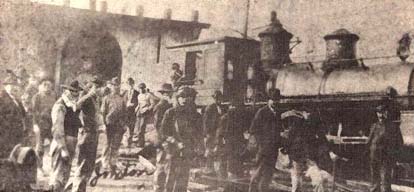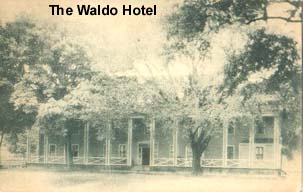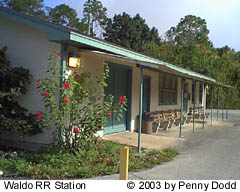In 1853, the State General Assembly
authorized a railroad to be built from Fernandina to Cedar Key, which would pass through
Bellamy station.
Henry Flagler's Florida Railroad reached Bellamy
Station February 1, 1859. The railroad built a turnabout and railroad shop for repairs.
Passengers waiting for the next train north could have lunch and wait at what was later
known as the Waldo Hotel. The Waldo House, built in 1869, provided quarters for men
who worked for the railroad, at $2. per night. the Beckham House offered rooms at half the
price. It was owned by J.T.Green and was torn down in 1936, according to Rast MC
Michen.
The railroad was not completed to Cedar Key until 1861,
but the Depot building was not built until 1864. Merle DeSha was station master for
many years.
Before the Railroad machine shops were moved to
Wildwood and Baldwin, they were serviceing 25 freight trains and 12 passenger trains
which made daily stops at the depot It was during this boom, in 1928 that Waldo was
made the official railroad terminal of the Seaboard Airline Railroad..
According to notes by Rast MC Michen, he
remembers that in 1928. Mr. Bagley, general manager of SAL wanted to enlarge the
railroad shop area, but the City Council told him 'no', Bagley got up in the middle
of the meeting and said he would make a mile post of the town. The meeting was on a
Thursday evening. On the following Monday work trains and wrecking crews tore down
everything and moved it to Waldowood and Baldwin.
After the 1929 financial crash, business dropped to a
low point, by 1932 the town was in financial trouble and the population declined to less
than 500 residents. The only work available was from WPA and at Camp Blanding.
The train still stops to pick up and drop off
passengers, but the ticket office has been closed and moved to Palatka. This
happened due to negative action of the City Council.
The Red Caboose located in the City
Park, was acquired by the city of Waldo from the Seaboard System Railroad(CSX Corp.) in
1986. It serves as an inspiration for the annual Waldo Railroad Days held in
April. Two historical markers located nearby give a brief history of the town and
information about Waldo during the Civil War.
On April 25, 1987 the First Annual Waldo Railroad Day was
celebrated, with dedication of the Caboose, located in a park in the center of town, and
donated by the Seaboard Railroad.

The Round House railroad turnabout |

The Waldo House Hotel |
The Waldo Post Office was established on
August 5, 1858. Wiley Hicks was appointed as the towns first Postmaster, when it was
established, David Yulee renamed Bellamy Station, Waldo
Benjamin Waldo, son of Dr. Joseph Warren Waldo and
Elizabeth Lamar (Smith), his wife, was born in Edgefield District, South Carolina,
Dec. 11, 1816; died in Marion County Florida, near Ocala, April 4, 1871. He
graduated with first honors at the Jefferson Medial College, Philadelphia, Pa. in 1838,
after which he and his sister Elizabeth returned to their home in South Carolina.
Soon afer his return south he was called to render medical service to a young lady,  Miss Sarah Lipscomb, who had been given up to die in the last stages of
typhoid or typus fever. Under the treatment of the "young Southerner" the
young lady soon convalesced and rapidly recovered; and probably the young doctor
continued his visits long after his medical skill was not required, for in less than one
year after his first visit he married his fair patient and settled in Newberry in
Florida. He soon had a large and flourishing practice and became a
brilliant and influential member of society, highly respected throughout the
State. He was also a member of the state legislture. About the year 1849-50 he
moved his family to a large plantation near Ocala, Florida, where he lived and
died. The town of Waldo on the Transit Railroad across the peninsula of Florida was
named in honor of Dr. Benjamin Waldo. Miss Sarah Lipscomb, who had been given up to die in the last stages of
typhoid or typus fever. Under the treatment of the "young Southerner" the
young lady soon convalesced and rapidly recovered; and probably the young doctor
continued his visits long after his medical skill was not required, for in less than one
year after his first visit he married his fair patient and settled in Newberry in
Florida. He soon had a large and flourishing practice and became a
brilliant and influential member of society, highly respected throughout the
State. He was also a member of the state legislture. About the year 1849-50 he
moved his family to a large plantation near Ocala, Florida, where he lived and
died. The town of Waldo on the Transit Railroad across the peninsula of Florida was
named in honor of Dr. Benjamin Waldo.
In the 1870's Waldo was advertised as a Winter Playground
attracting Tourists who arrived by railroad to vacation. There was an opera house
which presented plays, lunches served at the WaldoHotel,baseball, and cruises on the Lake
Alto
The Florida Advertiser was a weekly newspaper in Waldo in
the 1880's. The publisher was W.B.Johnson and its editor and proprietor was
J.B.Johnson. The newspaper was in a constant battle with the Railroad
concerning the rundown condition of the Station, and their disregard for the comfort and
safety of the passengers. The paper was sustained by advertising and circulation.
From DeSha book
By the 1960's a great number of the railroad men who had seen Waldo
grow and flourish during the twenties, lose out entirely in the early thirties, only to
struggle back during the War, were now retired or planning on retirement. Local
ex-conductor B.M.Harvey started his career as a beginning brakeman in 1909, and served on
the Silver Meteor, the run between Jacksonville and Miami, for over fifty years.
Brainard was one of the few conductors who could run an engine and substitute for the
engineer when needed.
J.H.Granger who retired a month before Harvey, i 1959, was an
ex-conductor also and a close friend of Brainard's. He lived on Cracker Hill, in the
beautiful, old fashinoned Granger home, near the railroad tracks and the trains he loved.
Like Russell Phillips of McIntosh, he remembered how Brainard ran the engine while
the engineer ate his lunch.
Granger, Harvey, and Phillips started their railroad careers when
the conductor hired his own brakeman and flagman, and the engineer of the old woo-burner
hired his own fireman. There were no contracts. Brainard was also a good
baseball player and in the early days of his career left his $1.10 railroad job to earn
$15. per day playing ball. Harvey made his last run in the company of his wife
Mamie, and his daughter Muriell Turner of Palatka. A crowd of railroad friends met
him at the station to give him a gift from the town.
|

